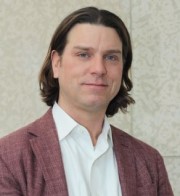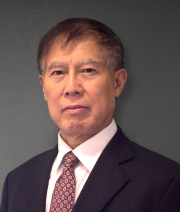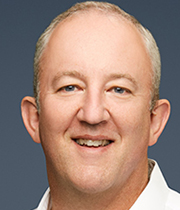Seminars
Landslide Characterisation in Arid Climates (Western Canada)
 Dr. David Elwood, PEng
Dr. David Elwood, PEng
Professor of Geotechnical Engineering
Department of Civil and Environmental Engineering, University of Saskatchewan
Thursday, August 3, 2023
1: 30 – 2:30 pm Spencer Engineering Building 1200
Watch on YouTube
Abstract:
Landslide characterization in Western Canada presents unique geohazards, that are not typical to most parts of the developed world. The presence of heavily overconsolidation ground moraine coupled with irregular glaciolacustrine clays present challenges as they relate to conventional sampling and testing methods. The presence of extremely weak, Cretaceous clay shale interbedded with layers of bentonite further exacerbate the risks for the designer and consideration needs to be provided for non-rotational failures. Recently, extreme weather conditions have shown that the status quo for river valley stability is in jeopardy and new methods of risk determination need to be employed. Methods have been developed that have focused on understanding the role of river stages and snowpack on the potential for groundwater infiltration and loss of matric suction. This has provided a basis for a predictive method for an upcoming spring and summer based on weather patterns in the previous fall and winter (or vice-versa).
Biography:
David Elwood is a professor in geotechnical engineering at the University of Saskatchewan. David grew up in London and completed his undergraduate degree at the University of Western Ontario. He has published on the topic of soft ground tunneling in glacial deposits, soil mechanics and site characterization. Dr. Elwood is currently a standing member of the Technical Committee for Ground Property Characterization from In-Situ Tests (TC-102)as part of the International Society of Soil Mechanics and Geotechnical Engineering (ISSMGE) as well asan associate board member of the Canadian Geotechnical Journal. Dr. Elwood is an active consultant as ageotechnical engineer both nationally and internationally. He has nearly 25 years of consulting experience.
Nonlinear Rheological Models of Clayey Soils and Applications
 Professor Jianhua Yin
Professor Jianhua Yin
Chair Professor of Soil Mechanics
Leader of Geotechnical Unit
Department of Civil and Environmental Engineering
The Hong Kong Polytechnic University, Hong Kong, China
Monday, July 3, 2023
2:00 – 3:00 pm Spencer Engineering Building 3109
Watch on YouTube
Abstract:
The speaker firstly gives a brief introduction to issues of large settlements of foundations or artificial islands on soft soil grounds. Most of such large settlements are caused by creep of clayey soil skeleton due to effective stresses. The mechanism of creep is briefly explained. The speaker then presents a number of one-dimensional (1D) linear rheological models, including Maxwell model, Kelvin model, and a few composite models and their applications in 1D consolidation analyses. After this, the speaker introduces an 1D Elastic Visco-Plastic (1D EVP) model proposed by Yin and Graham (1989, 1994) and its applications in 1D consolidation analysis of soft soils by different researchers. How to do derive this 1D EVP model, its calibration, and verification are included in his ppt, but may not be presented due to time limit. The speaker then introduces a 3D EVP model based on (i) Perzyna’s work (1966), (ii) Modified Cam-Clay model (Roscoe and Burland 1968), and the 1D EVP model (Yin and Graham 1989, 1994), the application of this 3D EVP model, and its comparison with Soft Soil Creep model in Plaxis. After this, nonlinear functions for creep and compression in 1D straining are presented overcoming a few limitations of logarithmic function, followed by other new works by the speaker and others. Conclusions and remarks are given at the end.
Biography:
Professor Yin received a PhD from The University of Manitoba, Canada in 1990. He joined Department of Civil and Environmental Engineering, The Hong Kong Polytechnic University in 1995 starting from an Assistant Professor to Associate Professor, Professor, then promoted to Chair Professor in 2012. He is now Chair Professor of Soil Mechanics of the University and Leader of Geotechnical Unit of the department. Professor Yin has a good track record in research and has played a leading role in development of advanced soil testing equipment, innovative fiber optical sensors, establishing a large-scale multi-purpose physical modeling facility for studying geo-hazards, organization of regional and international conferences.
Professor Yin serves as a Vice-President of International Association for Computer Methods and Advances in Geomechanics (IACMAG) (founded in USA) since 2005, a founding Co-Editor of International Journal of Geomechanics (ASCE). He has received the honours of the prestigious “John Booker Medal” in 2008, “Chandra S. Desai Excellence Award” in 2011, and “Outstanding Contributions Medal” in 2017 from all IACMAG. He received “Mao Yi-Sheng Soil Mechanics and Foundation Engineering Youth Award” for 2000. An Elastic Viscoplastic (EVP) model and its application in consolidation analysis of soils by Yin and Graham (1996 published in Géotechnique) was considered a milestone contribution in Geotechnique (Top 1 journal in geotechnical engineering) in last 60 years (Zdravkovic L. & Carter, J., 2008. Contributions to Geotechnique 1948–2008: Constitutive and numerical modelling. Geotechnique 58, No. 5, 405–412). He delivered the highstatus 2011 “Huang Wenxi Lecture” in Chinese Mainland. He was ranked in Top 88 among 58101 scientists in “Geological & Geomatics Engineering” in World’s Top 2% Scientists by Stanford-University in 2022.
 Speaker: Professor Phil Watson
Speaker: Professor Phil Watson
UWA Oceans Institute
University of Western Australia
Perth, Australia
Thursday, December 16, 2021
7 - 8 p.m.
Zoom - https://westernuniversity.zoom.us/j/92814351346
Topic: Design and installation experience with offshore gravity base structures
Summary: In this seminar, the speaker will reflect on his design and installation experience with two unique ‘self-installing’ gravity based offshore platforms – namely the Yolla platform in the Bass Strait (Australia) and the Maari platform in the Taranaki Basin (New Zealand).
Biography: Phil Watson is a highly experienced offshore geotechnical engineer, with over 25 years oil and gas experience and previously held the position of Global Director of GeoConsulting for Fugro. At Fugro he was a champion of innovation and technology development, working to integrate specialist consulting teams around the world, and with a commitment to sharing expertise and streamlining access to leading edge design approaches. Prior to joining Fugro, Phil was a Director of specialist geotechnical consulting firm Advanced Geomechanics, who he joined after several years working at Arup in Perth and globally. Phil is a Fellow of The Australian Academy of Technology and Engineering, a Fellow of the Institution of Engineers Australia, the current Chair of ISSMGE Technical Committee 209 ‘Offshore Geotechnics’, and a committee member of ISO WG10 / API RG7.

